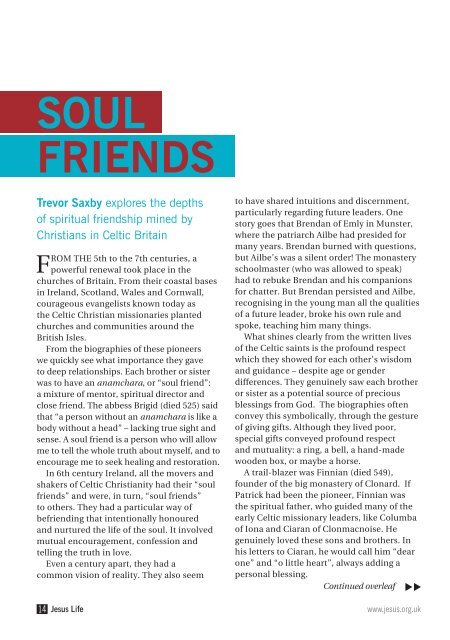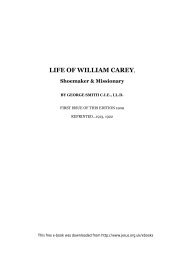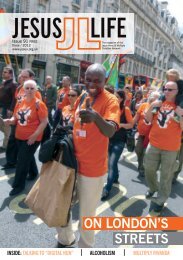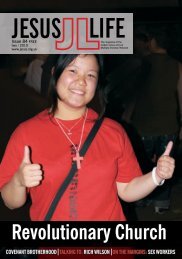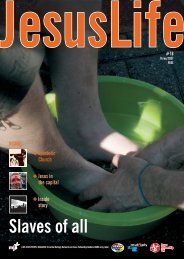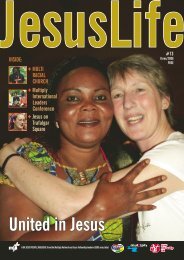Jesus Life 90 - Jesus Army
Jesus Life 90 - Jesus Army
Jesus Life 90 - Jesus Army
Create successful ePaper yourself
Turn your PDF publications into a flip-book with our unique Google optimized e-Paper software.
SOUL<br />
FRIENDS<br />
Trevor Saxby explores the depths<br />
of spiritual friendship mined by<br />
Christians in Celtic Britain<br />
FROM THE 5th to the 7th centuries, a<br />
powerful renewal took place in the<br />
churches of Britain. From their coastal bases<br />
in Ireland, Scotland, Wales and Cornwall,<br />
courageous evangelists known today as<br />
the Celtic Christian missionaries planted<br />
churches and communities around the<br />
British Isles.<br />
From the biographies of these pioneers<br />
we quickly see what importance they gave<br />
to deep relationships. Each brother or sister<br />
was to have an anamchara, or “soul friend”:<br />
a mixture of mentor, spiritual director and<br />
close friend. The abbess Brigid (died 525) said<br />
that “a person without an anamchara is like a<br />
body without a head” – lacking true sight and<br />
sense. A soul friend is a person who will allow<br />
me to tell the whole truth about myself, and to<br />
encourage me to seek healing and restoration.<br />
In 6th century Ireland, all the movers and<br />
shakers of Celtic Christianity had their “soul<br />
friends” and were, in turn, “soul friends”<br />
to others. They had a particular way of<br />
befriending that intentionally honoured<br />
and nurtured the life of the soul. It involved<br />
mutual encouragement, confession and<br />
telling the truth in love.<br />
Even a century apart, they had a<br />
common vision of reality. They also seem<br />
14 <strong>Jesus</strong> <strong>Life</strong><br />
to have shared intuitions and discernment,<br />
particularly regarding future leaders. One<br />
story goes that Brendan of Emly in Munster,<br />
where the patriarch Ailbe had presided for<br />
many years. Brendan burned with questions,<br />
but Ailbe’s was a silent order! The monastery<br />
schoolmaster (who was allowed to speak)<br />
had to rebuke Brendan and his companions<br />
for chatter. But Brendan persisted and Ailbe,<br />
recognising in the young man all the qualities<br />
of a future leader, broke his own rule and<br />
spoke, teaching him many things.<br />
What shines clearly from the written lives<br />
of the Celtic saints is the profound respect<br />
which they showed for each other’s wisdom<br />
and guidance – despite age or gender<br />
differences. They genuinely saw each brother<br />
or sister as a potential source of precious<br />
blessings from God. The biographies often<br />
convey this symbolically, through the gesture<br />
of giving gifts. Although they lived poor,<br />
special gifts conveyed profound respect<br />
and mutuality: a ring, a bell, a hand-made<br />
wooden box, or maybe a horse.<br />
A trail-blazer was Finnian (died 549),<br />
founder of the big monastery of Clonard. If<br />
Patrick had been the pioneer, Finnian was<br />
the spiritual father, who guided many of the<br />
early Celtic missionary leaders, like Columba<br />
of Iona and Ciaran of Clonmacnoise. He<br />
genuinely loved these sons and brothers. In<br />
his letters to Ciaran, he would call him “dear<br />
one” and “o little heart”, always adding a<br />
personal blessing.<br />
Continued overleaf<br />
s<br />
s<br />
www.jesus.org.uk


